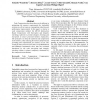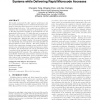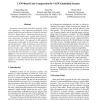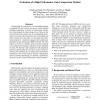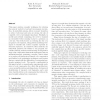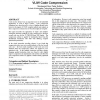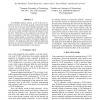119
click to vote
SBACPAD
2004
IEEE
15 years 3 months ago
2004
IEEE
Code compression has been used to minimize the memory area requirement of embedded systems. Recently, performance improvement and energy consumption reductionare observed as a by-...
113
click to vote
RECOSOC
2007
15 years 3 months ago
2007
Code Compression has been shown to be efficient in minimizing the memory requirements for embedded systems as well as in power consumption reduction and performance improvement. I...
147
click to vote
CASES
2005
ACM
15 years 4 months ago
2005
ACM
Code compression is a field where compression ratios between compiler-generated code and subsequent compressed code are highly dependent on decisions made at compile time. Most op...
142
click to vote
CODES
2009
IEEE
15 years 5 months ago
2009
IEEE
Microcoded customized IPs offer superior performance and direct programmability of micro-architectural structures compared to instruction-based processors, yet at the cost of dra...
123
click to vote
DATE
2004
IEEE
15 years 5 months ago
2004
IEEE
Embedded software is becoming more flexible and adaptable, which presents new challenges for management of highly constrained system resources. Software dynamic translation is a t...
103
click to vote
DATE
2004
IEEE
15 years 5 months ago
2004
IEEE
We propose a new variable-sized-block method for VLIW code compression. Code compression traditionally works on fixed-sized blocks and its efficiency is limited by the small block...
131
click to vote
MICRO
1999
IEEE
15 years 6 months ago
1999
IEEE
Compressing the instructions of an embedded program is important for cost-sensitive low-power control-oriented embedded computing. A number of compression schemes have been propos...
179
click to vote
PLDI
1999
ACM
15 years 6 months ago
1999
ACM
This paper explores compiler techniques for reducing the memory needed to load and run program executables. In embedded systems, where economic incentives to reduce both ram and r...
120
click to vote
CASES
2003
ACM
15 years 7 months ago
2003
ACM
Code size has always been an important issue for all embedded applications as well as larger systems. Code compression techniques have been devised as a way of battling bloated co...
137
click to vote
IWSOC
2003
IEEE
15 years 7 months ago
2003
IEEE
In embedded systems, memory is one of the most expensive resources. Due to this, program code size has turned out to be one of the most critical design constraints. Code compressi...

